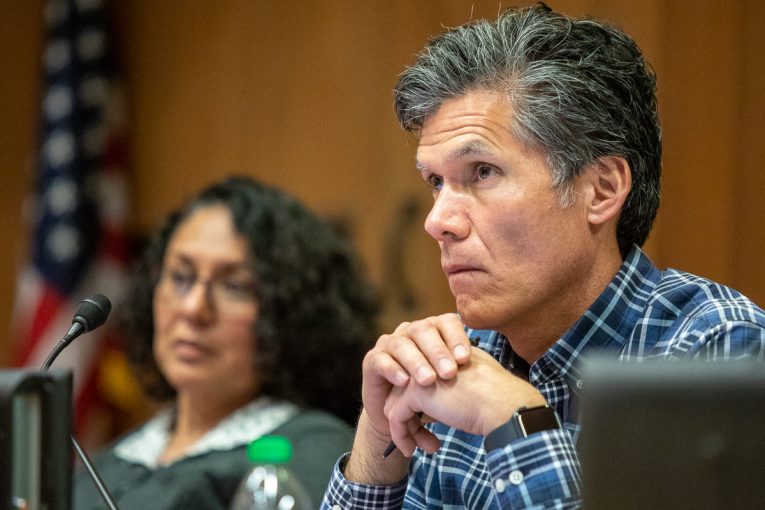
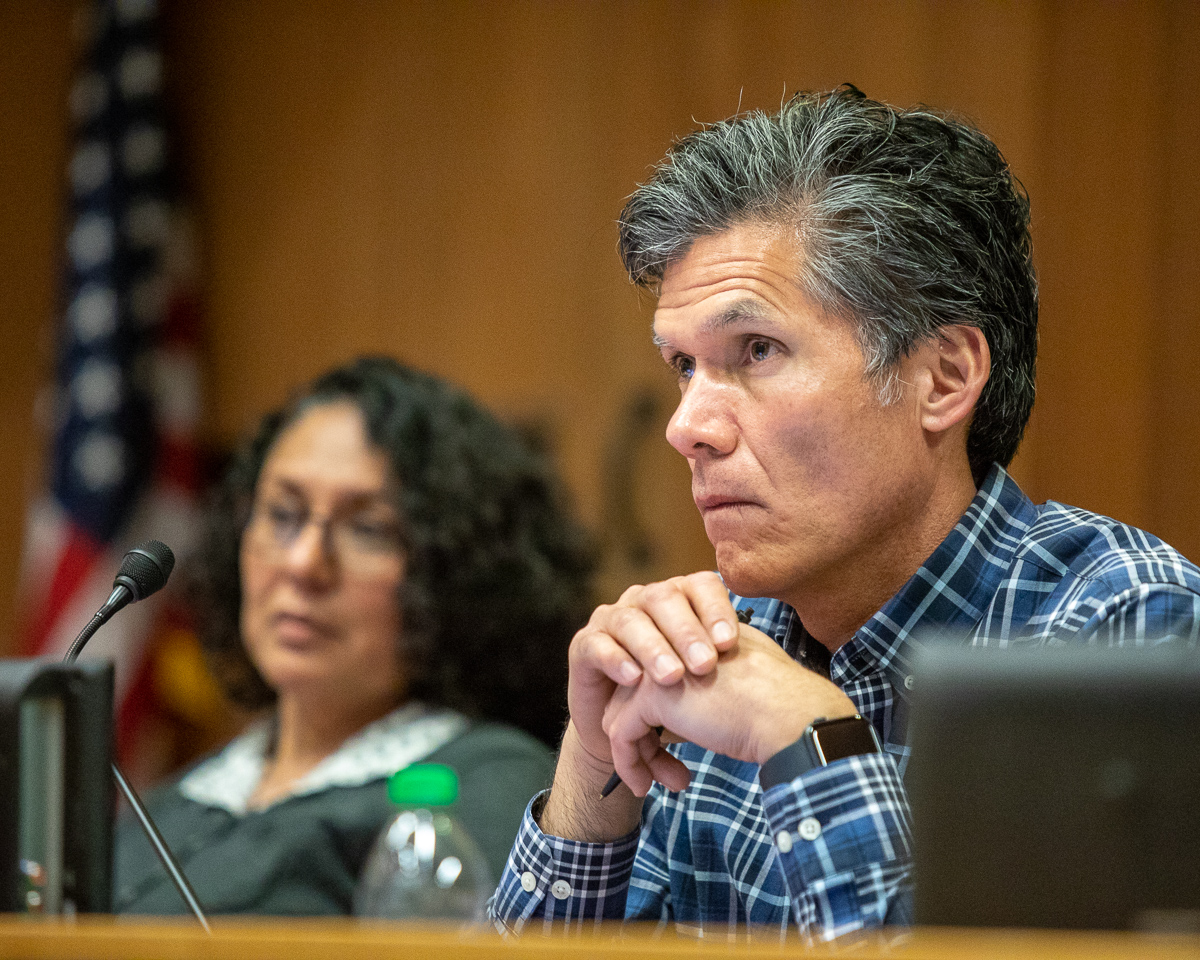
The city kept the survey hidden from the public until it was presented on Tuesday night. Once unveiled, the results were stark and somewhat overwhelming.
There were three key trends, in addition to overwhelming support for a renewal of the sales tax.
Key findings from the survey include:
- Voters are overwhelmingly satisfied with the quality of life in Davis as well as with City of Davis services.
- Respondents had a significant concern about housing availability.
- The electorate supports renewal of the City’s one percent sales tax.
- Residents feel that maintaining emergency response times and maintaining City infrastructure are critical priorities.
- The majority of those surveyed felt the City of Davis was moving in the right direction.
The survey was conducted by EMC Research from May 23-31, 2019, with 500 completed interviews via landline and cell phone interviews and a web version of the survey. The overall margin of error is plus or minus 4.38 percentage points.
Overall the respondents felt that the city was moving in the right direction (54 percent) compared to 24 percent believing it was on the wrong track and 22 percent not knowing. The consultant told the council, “Overall, based on my experience, these are great numbers.”
The voters gave high marks for: quality of the parks, overall quality of life, overall image and reputation of the city, safety of the city, openness and acceptance of the community towards people of diverse backgrounds, and the job that the city is doing to provide city services.
The numbers, however, shrank a bit in the next tier with maintenance of the streets getting a net positive but it was a 58-42 split (with almost no one stating that they didn’t know). Efforts to communicate with residents was an overall positive with a 62-24 split, and responsiveness to citizen complaints fell below 50 percent but was 43-23 positive.
The performance of the council likewise was a net positive, but at a 43-21 percent split there were 36 percent that did not know. The margin shrank further on management of finances, with 36-27 positive but a whopping 37 percent who do not know.
Downtown parking dips into the net negative, with 55 percent registering dissatisfaction compared to 42 positive (once again a tiny percentage did not have an opinion).
Where the city gets hit the hardest is on the affordability of housing, with only 18 percent satisfied (only 3 percent of that very satisfied) – and a whopping 79 percent unsatisfied.
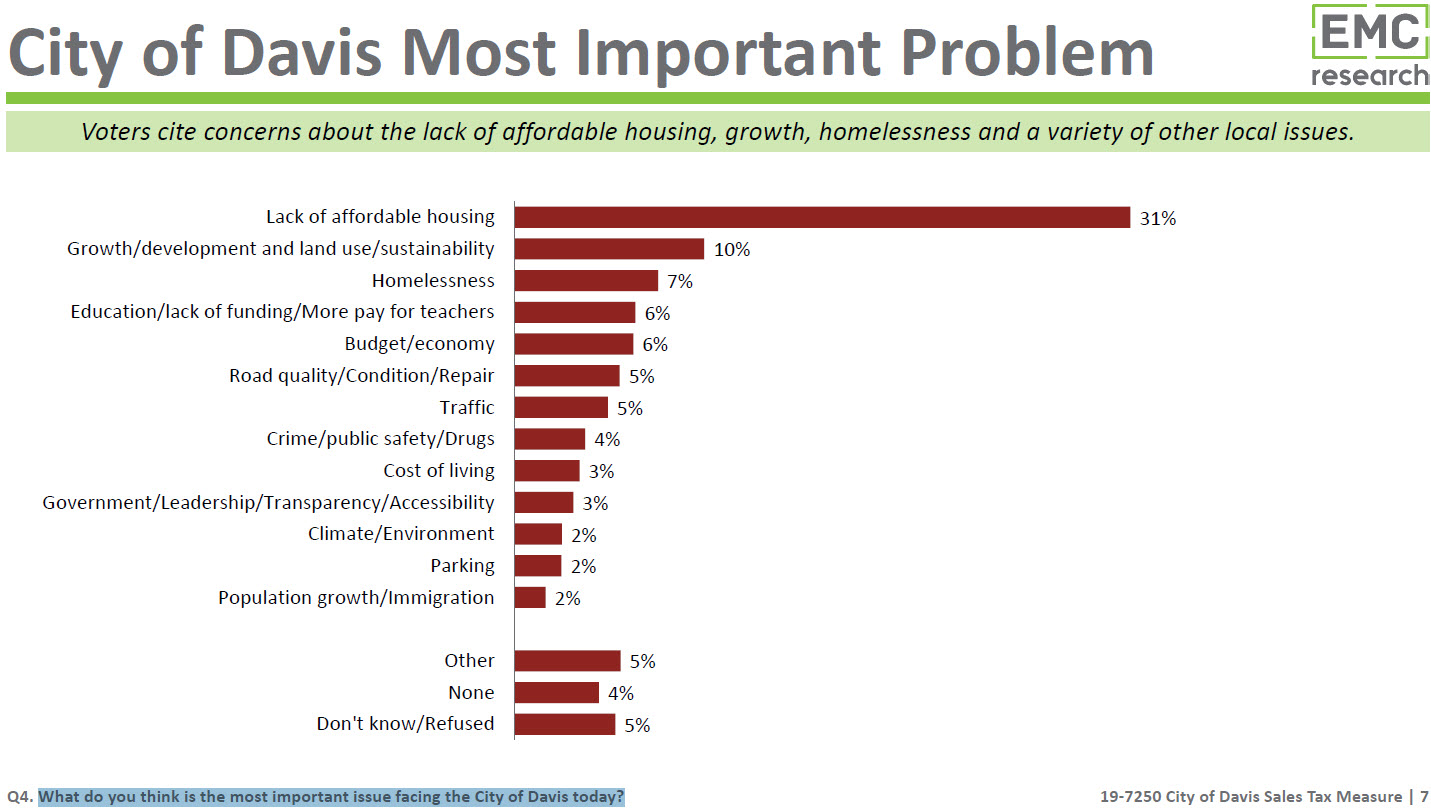
That leads us to the biggest issue facing the community. A whopping 31 percent responded “lack of affordable housing” when asked the open-ended question, “What do you think is the most important issue facing the City of Davis today?”
Raising perhaps the salience of that issue is the fact that growth/development is second at 10 percent, with homelessness third at 7 percent.
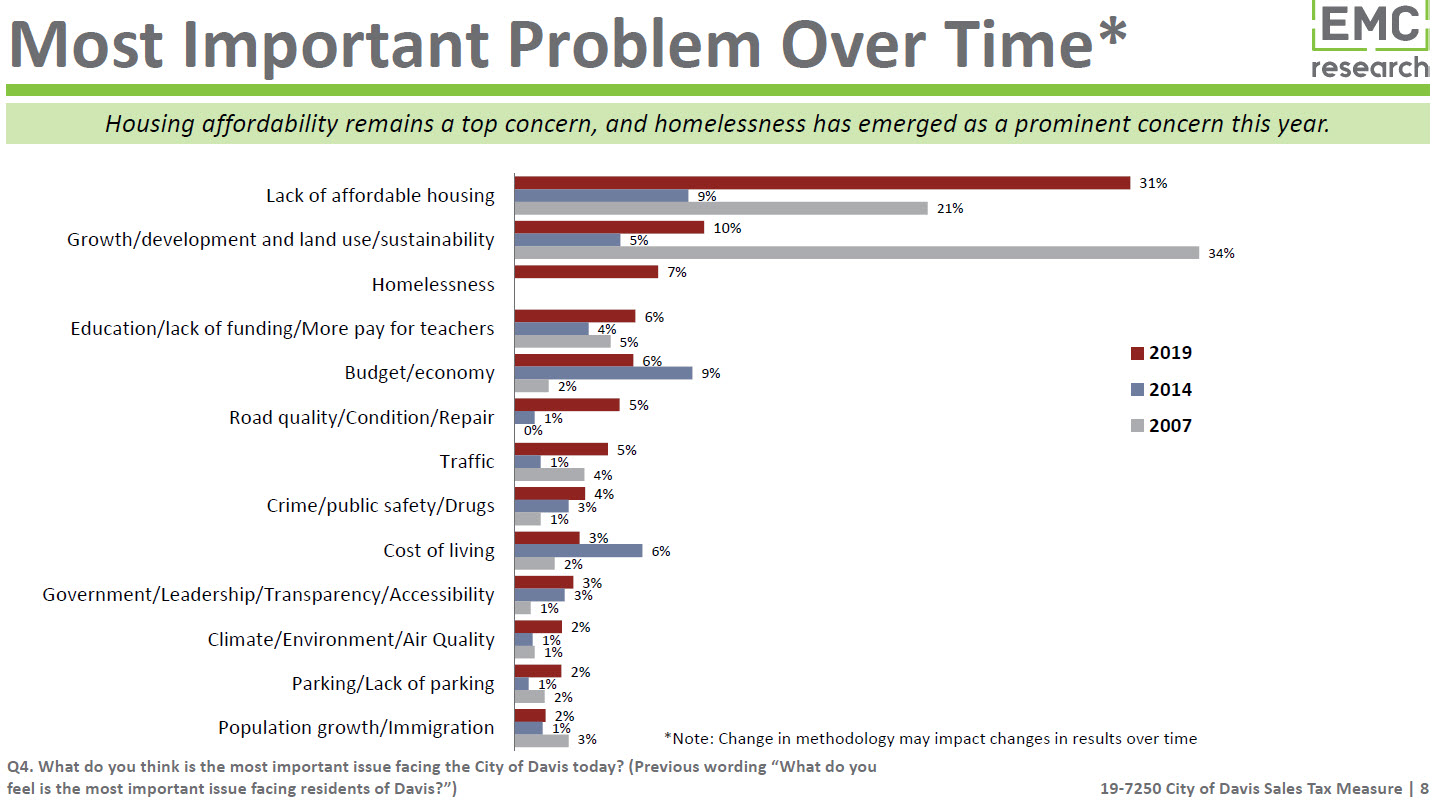
Breaking it down over time, we can see that homelessness was not even on the radar of folks in 2007 or 2014. Growth and development moved from the most important issue in 2007, to just 5 percent in 2014, and now back up to 10 percent.
Lack of affordable housing moves to the top issue up from 9 percent in 2014, but it was a robust 21 percent in 2007.

We can see a strong generational component, where the group aged 18 to 39 sees it as an overwhelming problem, decreasing to 32 percent by 40 to 49 and then dropping below a quarter for those over the age of 50.
Finally, there is a real question about voter knowledge in key areas.
The voters are very willing to offer an opinion on things that are visible, but when it gets into a more abstract analysis their knowledge level goes way down.
The issues that are most striking are performance of council, where 36 percent have no opinion and management of city finances registers a 37 percent “don’t know” response.
On the other hand, issues like streets, parking and housing have almost no people not registering an opinion.
The voters still give the city a net positive on streets – despite the poor conditions and despite the budget shortfalls – but in just five years, support has dropped from 77 percent to 58 percent, and the negatives have gone from 23 percent to 42 percent.
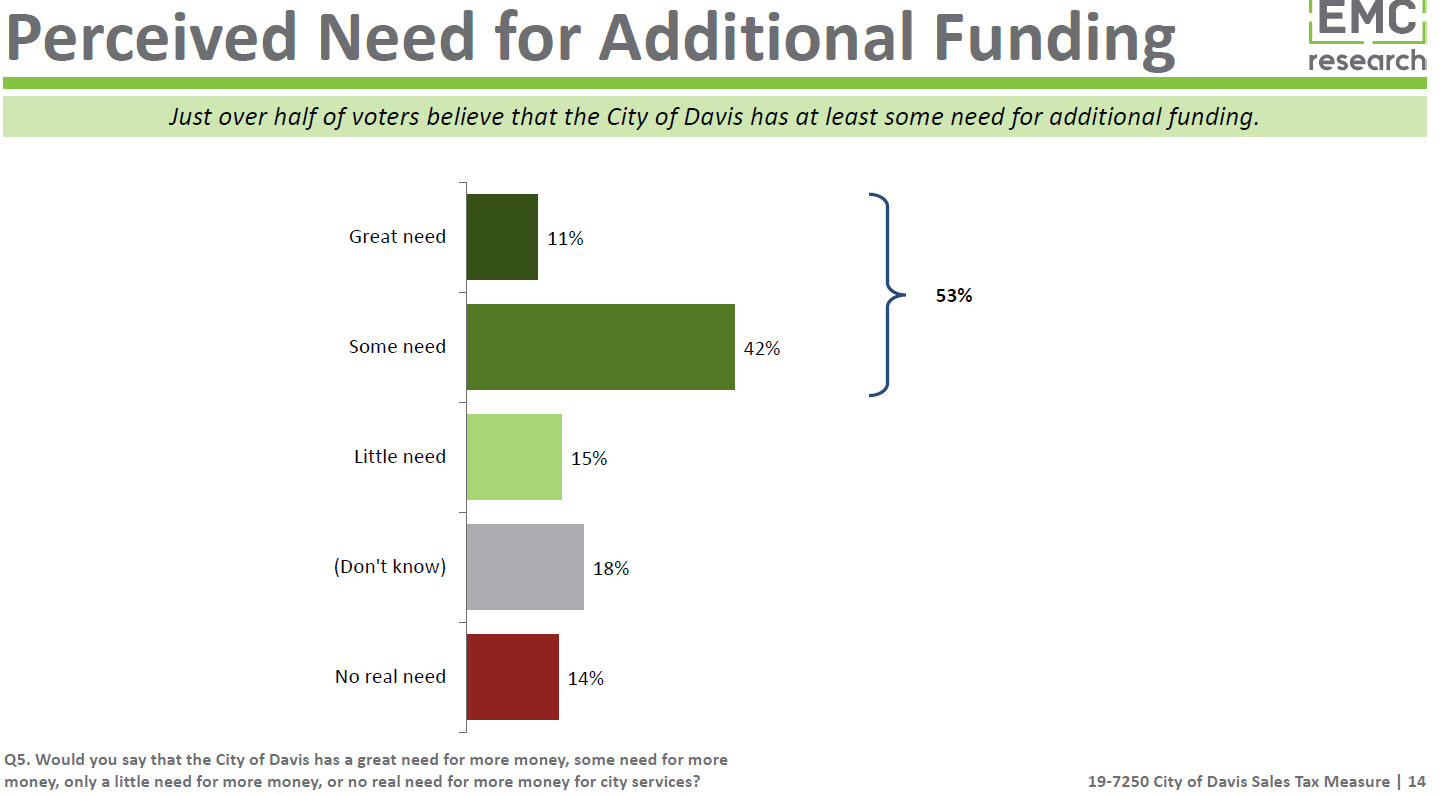
The perceived need for additional funding is 53 percent see at least some need – but only 11 percent see a great need, despite the large shortfalls for infrastructure. Overall it’s a 53-29 split, with 29 percent indicating little to no need and a somewhat sizable 18 percent who do not know.
—David M. Greenwald reporting


I participated in this poll. I’m somewhat surprised I’m so in the mainstream
To me this simply shows that housing is a big concern even in Davis and that it is more important for younger folks than older folks. But times are changing. If you are running against housing, you’re not going to win.
Sean… think bell curve… from what I’ve seen/heard of you, you’re either @ median, or within one standard deviation one way or the other… gives credibility to the survey that you were asked to participate in… thank you for your service… seriously…
I appreciate your views, even when I disagree…
Davis parks, now with 30% more vagrants!
Quality of “my” life apparently. They seem to not interviewed people who can’t afford cell phones or landlines, the “food insecure”, or the students living in their cars in parking lot of Safeway. Which Safeway was that again?
Toad tunnel to nowhere, little-Friday murder, citing the snoring, “Peoples Republic of Davis”, dais wars. I could go on . . .
So safe we have a reputation among the criminals passing by on I-80 as ‘easy targets’ because we feel we are so safe. Almost forgot, what about all the students on campus terrorized by campus police?
I guess their question didn’t penetrate the “dark underbelly” of Davis.
I especially like that machine they have that creates “public asphalt art” in the form of long, rough, irregular grooves of missing linear asphalt right about where bicycles are supposed to go.
Kind of interesting:
The survey shows that “Education/lack of funding/more pay for teachers” is the “most important problem” for just 6% of respondents.
And, that the Davis Enterprise is the “most important news source” for 28% of respondents, with the Vanguard or other local blogs at 2%.
Regarding “usefulness” of local news sources, the Enterprise generates a positive “net useful” response of 57%, while the Vanguard generates a NET NEGATIVE of 16%.
http://documents.cityofdavis.org/Media/CityManagersOffice/Documents/PDF/CMO/Press-Releases/2019-07-09-EMC-Research-City-Council-Presentation.pdf
I’m not a huge fan of the negative numbers, but the rest are actually not bad.
2 percent doesn’t sound like a great number, but if you project that over the course of the population that’s about 1200 people who view the Vanguard as the most important source of information for local news. That’s really a good number. Also, I suspect that some of the Facebook and online numbers are also the Vanguard, though not specified as such. Those numbers jibe with our internal numbers.
Also on positive/ negative – there are two aspects that are encouraging which again, I wish we had better negative/ positives numbers. First, 59% of those polled knew enough about us to form an opinion. That’s a very good number. And that 41 percent who were in the gray space of not knowing, that’s market share we can tap into.
If they’re “tapped into”, that might add to the negative rating. But, I’m glad to see you acknowledge some concern regarding the Vanguard’s negative perception.
Certainly, it’s a place where one side of an issue can be “learned” about.
In the Vanguard’s line of work, negative numbers are positive!
Can we get back on topic now – housing is the topic of this article
Note that the top result is affordable housing. Meanwhile, the City Council caved to developer pressure last year and dramatically reduced its affordable housing requirements. But we don’t see the Vanguard discussing that. Instead the MRIC/ARC project is mentioned multiple times, as if it will have anything to do with affordable housing. The reality: they’ll propose a few scraps like a 5% share of affordable housing and we’ll be told that’s better than nothing.
The issue is not necessarily “affordable housing.” The issue is lack of housing that is affordable which goes to a supply issue. You’re misreading the data
Rik: You’ve just noted one of the weaknesses, in surveys like this.
Certainly, MRIC would be nothing more than a “wash”, regarding “affordability” of housing.
And, I strongly suspect that your prediction (regarding “scraps”) will come true.
Funny… several (and am not accusing Rik) folk like to promote more “Affordable Housing” [note double capitalization], at the highest rate, in order to “make it about” poor, minorities, immigrants, etc., knowing they will find support for opposing such projects, or making it financially infeasible, when their real goal is no residential increase.
Seen this a number of times in Davis, where the ‘arguments’ have nothing to do with the real purpose… raw politics, not principled viewpoints… whatever “sells”…
The problem is that people are complaining about the lack of affordable housing in terms of subsidized housing they were complaining that housing in Davis wasn’t affordable.
If you doubt that look on the City Satisfaction Ratings page, it shows it as “the affordability of housing
and 79 percent are dissatisfied. Rik’s completely distorting the issue here.
The survey did not ask or disclose what respondents would choose to “do” (or not do) about this.
I also wonder how “affordability” will be perceived, after thousands of market-rate, primarily student housing units are built. I guess we’ll see.
Looking at the survey it appears that one of the biggest groups in need of housing our families people in the ages of 30 to 39.
Again, the survey discusses “affordability”. Nothing more, nothing less.
I’m also wondering about the actual breakdown in age groups of respondents. If any particular age cohort is under, or over-representative of the sample (or the population at large), then the resulting concern (by cohort) is meaningless.
For example, if there’s only one respondent in the survey (within a particular age group) who says that a given issue is of concern to them, the survey would show that “100%” of that age group are concerned about that issue.
Also wondering about the usual issues with surveys, such as lack of response from particular groups. I’m not seeing that described, in the results. In other words, who is responding, and how does that compare to the overall population?
True this wasn’t designed as a housing survey either but becomes pretty clear what people are thinking when they’re complaining about the affordability of housing.
In terms of the age breakdown it doesn’t really matter because if you look at the percentages across the board the issue of affordability of housing is higher than any other category. Even the lowest age category it’s still 20% which is twice in the other category. So the point I don’t think is valid
Noted in the link, above:
Wondering exactly how this works. Some were interviewed by phone, while others were invited to complete the survey online?
30% of a small number, is still a small #…
“Vagrant” is an interesting term, many meanings over the years… unclear as to your referent…
And, as to your “point”… should we re-purpose parks so ‘vagrants’ (whatever you mean by that) would “disappear”? I do not support public parks being ‘campgrounds’, “flop” places… but you are unclear as to what you propose. Or, even to the specific issue…
https://www.google.com/search?q=vagrant&oq=vagrant&aqs=chrome..69i57j0l5.3068j0j7&sourceid=chrome&ie=UTF-8
See dictionary referent.
Just saying…
It looks like the dominant paradigm has shifted. For many years the truth is stranger than fiction hypocrisy of people wanting to close the gate behind them once they had a piece of the pie has given way to the next generation becoming frustrated by being locked out and exploited by their elders through the resulting higher rents that not adding supply as demand has grown facilitates.
Is it any wonder that as rents have increased from lack of supply not keeping up with growth homelessness has also increased. It seemed surreal that so many seniors came out to support doing more for the homeless yet the survey shows that there is this generational divide on adding housing. I’m not saying that these same seniors are responsible individually but in aggregate the no growth baby boomers need to take responsibility for what the consequences of their policy preferences have done to the generations that followed.
It is also not surprising that senior housing passed at the ballot box. With seniors, the group most opposed to new housing, supporting a project designed to meet their own needs, there were few left in opposition.
Looks to me more like paradigms… not clear of the inter-relationships… may or may well not be…
But, your main thrust I agree with… “the times, they are a-changing”… but complex, not simple.
There are arguments about “climate change”… but as we have repeatedly seen, there is also “tectonic changes”… some might think that is man-made too, but I am a denier on that it is human induced.
We are seeing socio-economic, generational changes too… those are real…
Ron G. stated “ as rents have increased from lack of supply not keeping up with growth…” But if you actually look at the data, rents in Davis have increased at lower rates than other areas with much higher growth rates.
The problem is that you’re trying to argue that there is not a problem here and most of the community doesn’t agree with you and so he ended up on the losing side on key issues last year and instead of trying to find a way forward you’re attacking people who disagree with you.
Rent data as of 2019 from rentcafe.com
I think the $ total and $ increases are more relevant to most renters than the % increases. Also the fact that Davis rents are 48% higher than Dixon, and 64% higher than Woodland.
Using 30% of income for housing, residents would need the following income to live in each city to rent an apartment.
Davis: $40/hour
Dixon: $27/hour
Woodland: $24.50/hour
Makes it pretty obvious why people in Davis at the lower end of the wage scale are crowding into apartments and houses to share rent at steadily increasing rates.
Just to complete the picture:
Don: Not sure what the median size is, but those numbers certainly make one question the “premium” that Davis commands.
Davis is a superior city in many ways, but is it “that” superior?
For many newcomers to the area (especially those with families), it seems that it is “not” worth it. And, those communities are far more than accommodating of the type of sprawl that appeals to families. I don’t see much that will change, regarding that difference. Of course, there’s always been some difference – even when Davis allowed a lot more sprawl.)
I wonder if “affordability” is a concern, in those nearby communities? (Probably depends upon who you ask.)
What I’ve noticed is that folks generally move on, when an income/housing balance reaches a point where it no longer makes sense to stay. In other words, a market-based “solution”.
That’s why there’s a net outflow of lower-income people leaving the Bay Area (and the entire state), for example.
Unless they secure Affordable housing, or rent control. Or, they live on the fringes of more costly areas.
For example, I believe that Marin county might attract low-wage workers from areas such as Vallejo.
There’s also a large-scale, subsidized housing development in the form of “Marin City”.
Don: Are rental houses (vs. apartments) included in that data? (Most of which would be considerably larger than 919 square feet?)
Perhaps a reason that it’s going to be difficult to stop the “mini-dorm” phenomenon. Even with the city restricting the size of remodels.
In any case, it will be interesting to see what impact (if any) the megadorms (and other planned apartment complexes) will have regarding rental prices.
Yeah one year I lived in a house. It was a big house. The problem is that there were 8 people living in a 4 bedroom house. I lived on the couch in the living room and we hung up a sheet so I could have some semblance of privacy. I kept the rent down that way, but it sucked.
It sounds awful, but as you noted – it’s cheap. (And, if those houses are close to UCD, they’re conveniently-located as well. Probably have some parking available, too.)
Regardless, the square footage is more than you’d get in an apartment.
Seems to me that the only ones who would tolerate such conditions are students. As soon as they graduate – they’re outta there. And for the most part, leave Davis as well.
No. People who work in Davis “tolerate” such conditions as well.
Don: I’m sure there’s some. Ultimately, it depends upon variables such as where they work, their long-term plans, and comparisons to what’s available in surrounding communities (or elsewhere).
Note the chart you posted, for example.
It might also depend upon whether or not they secure Affordable housing, in Davis.
Je d’accord… never remembered about thinking of %-ages (except interest rates on mortgages, etc., when they ran @ double digits)… thought a lot about $$’s…
One thing that I think we can all agree on is that wages have not kept up with the cost of living.
I also think we (as a society) are not telling young people the truth, regarding the consequences of incurring debt (e.g., by moving away from home, prematurely), the cost of tuition, and the consequences of choosing a field of study which isn’t in demand.
Offering fields of study, without any relationship/consideration of market value to students is rather scandalous. Especially given the immediate (and long-term) costs to students of doing so.
Then again, we each have our own individual strengths and weaknesses. Not everyone can be a successful engineer, computer scientist, etc. (At least, not as easily as some others.)
In the “old days”, “any” degree was valuable and set one apart from those who didn’t have a degree. (Not anymore.) Of course, college was also free (or nearly-so), in those days.
Ron O. said: ”One thing that I think we can all agree on is that wages have not kept up with the cost of living”
Very true. The housing “crisis” is fundamentally an income stagnation and wage gap/inequality crisis. That’s one reason why it affects both slow growth and laissez-faire build-baby-build communities.
I think that might be a mistake to view it that way. It’s only a problem if you believe that your college major defines your career path. I have been tracking Davis HS students who have, in one example, a college degree in philosophy who is working for Google. Or a liberal studies degree working for Pixar. Two notable extremes, but plenty of other related examples.
That does occur, and there’s more than one type of job available at those companies.
But for highly technical fields (where the best prospects often are), one generally needs specific education and skill. Sometimes, people have an aptitude for it, and/or learn it on their own.
Some jobs require specific education, licensing, etc.
On the other hand, some of the most highly-successful people (who own/run companies) are college drop-outs:
https://mashable.com/2016/09/22/12-entrepreneurs-who-dropped-out-of-college/
In general, I’d recommend avoiding liberal arts degrees – if one has aptitude for more in-demand degrees. Some “aptitude” can be developed, via study.
Just the other day, I read an article which listed some of the degrees that people “regretted” pursuing. (I think English studies were at the top of the list.)
Here’s one such article:
https://www.marketwatch.com/story/this-is-the-most-regrettable-college-major-in-america-2019-06-25
Let’s face it – very few would go through the expense and hassle of getting a degree, if they didn’t believe there’d be a good job waiting for them on the other end.
In general, our society has done a very poor job of tailoring education to meet market demand. There’s more effort to do so, today (e.g., via the focus on “STEM”).